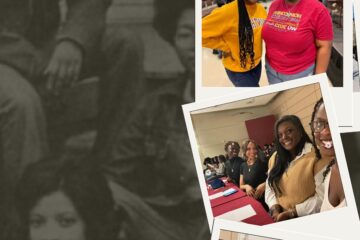“Stickfly” is a play by American playwright, Lydia R. Diamond, that was put on production at Winthrop from Wednesday, Oct. 5 through Oct. 9. The show takes place in the Levay family home. The Levay boys, Kent and Flip, decide to bring home their respective girlfriends, Taylor and Kimber to meet their father, Joseph. They are also joined by Cheryl, who is the stand-in housekeeper for her sick mother. Together the group deals with discussions and disagreements over race, class and gender issues while battling with secrets of their own.
With this show being a predominantly Black production, this is some of the students’ first Black production — giving them a chance to immerse themselves in the Black experience within theater.
Freshman and theater performance major Destiny Gore plays Taylor. Gore found many similarities with her character from the jump.
“I feel like me and Taylor are pretty much one in the same. I really came to terms with that over the rehearsal process,” Gore said. “She and I are a lot like every Black woman in America, we are strong about our opinions, and we want to tell everyone what we are thinking because we believe that we need to have our voice spoken. And I feel like with the political climate in America, right now, it’s more important now than ever to speak out about these things. And Taylor is such a beautifully written character. She has so much passion and so much love that is hidden by all this stuff that’s going on around her. I feel like it was beautiful, being able to find those quirks and those things that make her so beautiful and unique, and bring that to the stage.”
Gore praises Winthrop’s theatre department for making her first college production run smoothly and a fulfilling learning experience for others.
“I’ve been acting since I was in the seventh grade. And I’ve always done acting in a PWI space, and the PWIs have not always been as accepting as Winthrop has been and do not have as many beautiful messages brought to the stage,” Gore said. “It’s not just something Black people need to know for their own experience. But it’s something that white people will need to come and see. This is Black culture. And this is how important this is to us. And you should also want to feel like it’s important.”
Rayshawn Simuel, a sophomore theater education major who plays Flip, found himself playing a character that’s outside his comfort zone. Flip is a man who is the epitome of toxic masculinity, taking after his father’s roots.
“He is someone who is very arrogant and cocky. And I would say he’s a lady’s man. But he’s also a lady’s man who thinks that all the ladies belong to him. He is 37 and he just hasn’t gotten the idea that it’s time to grow up,” Simuel said. “He’s still in his own little world and thinks the world revolves around him. So he feels like everything is on his time. And he’s just the idea of toxic masculinity that you’ll see in everyday life.”
This is not Simuel’s first production at Winthrop as he is in his sophomore year and was previously in another predominantly Black production, Pipeline, last semester. He is excited to be able to play in authentic Black stories.
“In high school, I was just always the Black guy playing a white character. And for the first time, it feels like I’m a Black guy playing a Black character, and it feels amazing,” Simuel said.
Although Simuel didn’t initially want to play this character, he is leaving this show with a new perspective that will lead to more opportunities for him.
“When I first got the script, I read and saw what I had to do on the show. And what I have to be in the show, it almost brought me to tears. And it was one of those moments where I was like, ‘Oh, I can’t do this, I got to drop out of the show. Like, I cannot be this,’” Simuel said. “And it’s just one of those things where I had to sit back and actually have a conversation with myself and be like, ‘okay, it’s time to separate the actor from the character, you are not that character, you’re just playing that character.’ So it taught me a lot about discipline and resilience. And just the ability to overcome whatever fear or whatever personal feelings, I may have to tell a story like this.”
A character that plays on the opposite spectrum of Flip’s character is the brother himself, Kent, and Taylor’s fiance, played by junior and theater performance major Nekoda Moses.
Moses’s character, Kent, is a character who wants to break away from the generational and traditional idea of what it means to be a man.
“I think a lot of men, especially Black men, can take away that we don’t have to be the traditional and stereotypical strong, hyper-masculine, womanizer, or playboy,” Moses said. “You can chill out, you can be sensitive, you can be artistic, you can be loving, and you can be emotional. You can still be respected and respectful.”
Moses, like his co-stars, is also experiencing one of his first times being in a predominantly Black show.
“You know growing up every school I went to was a PWI. And I had fun doing theater. But this is the first show that I get to play a Black person and be a Black person,” Moses said. “For a long time like growing up I mainly hung around white people and so it’s been a wonderful experience just being around Black people. Just enjoying the time, because for a long time I didn’t get that experience, and being around white people is fun, you know, because I like being around people. But it’s not the same as being with people who kind of understand more of the experience that I’ve had. But just being there and seeing people who looked like me in this space and having people who kind of understand a little bit more deeply what it’s like to be me and be in my shoes. Just being Black, it’s a shared experience that is unique and it’s been nice to share that to have people to talk to who have shared that experience.”




